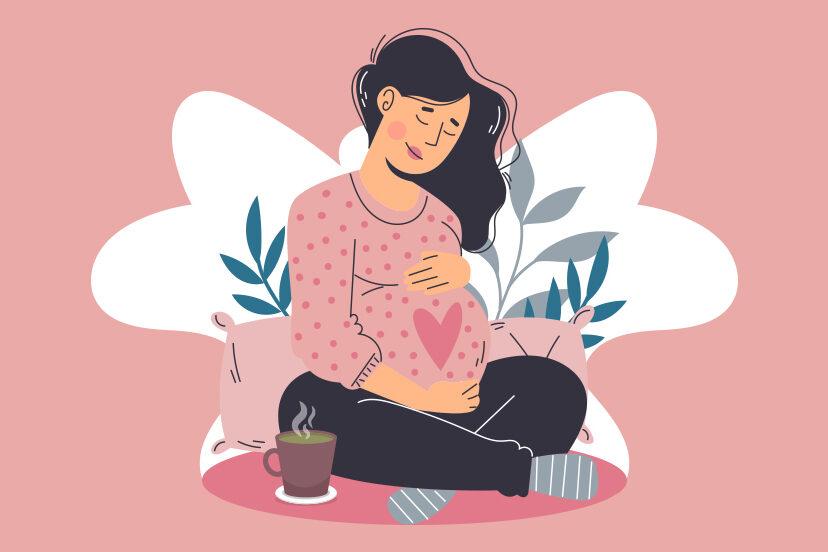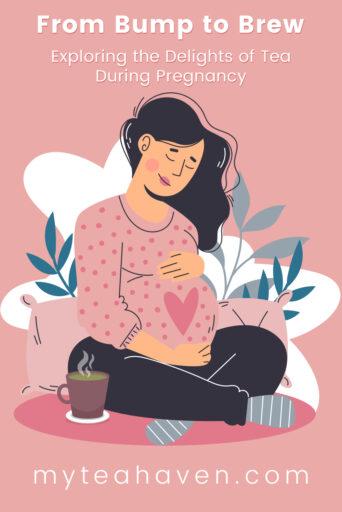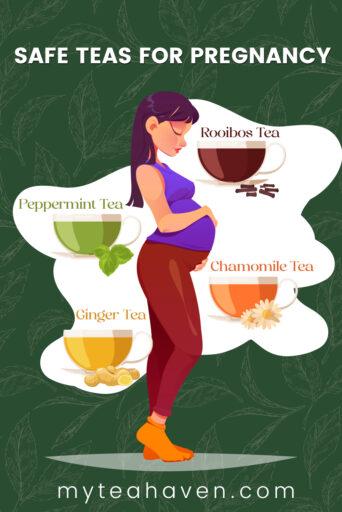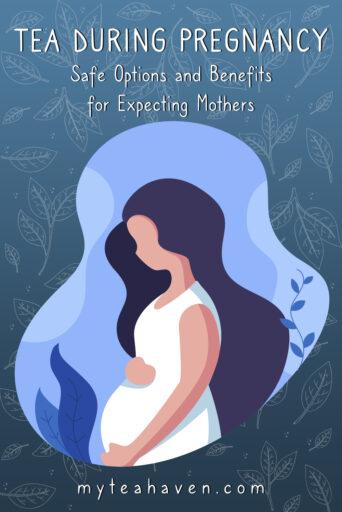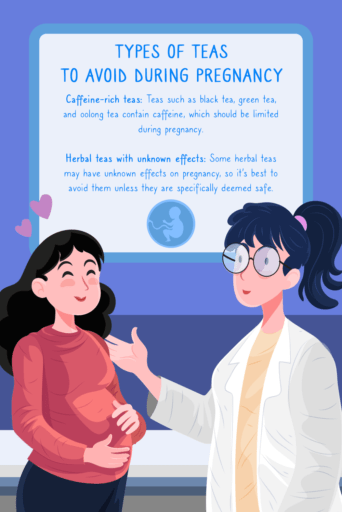From Bump to Brew: Exploring the Delights of Tea During Pregnancy
Tea During Pregnancy
As you embark on the journey to parenthood you may have thought about the safety and benefits of drinking tea during pregnancy. The aroma and warmth of a cup of tea can be very comforting, and it’s only natural to want to continue enjoying it while expecting. Is it safe to drink tea while pregnant? If so, which teas provide the most benefit for mothers and their developing babies. Today we will delve into these questions and find the answer together!
We are a participant in the Amazon Services LLC Associates Program, an affiliate advertising program designed to provide a means for us to earn fees by linking to Amazon.com and related sites. This post may contain affiliate links which means we may receive a commission, at no cost to you, for purchases made using our links. Please see my disclosure to learn more. Unless otherwise stated, all prices are in US$.
Is Tea Safe During Pregnancy?
Pregnancy is a special time that calls for extra caution when it comes to dietary choices. The good news is that, in general, tea can be enjoyed safely during pregnancy.
That being said, it’s important to be mindful of certain factors to ensure a healthy and enjoyable experience.

Types of Tea to Avoid
While tea can be safe during pregnancy, there are certain types that should be avoided or consumed in moderation due to their potential risks. These include:
- Caffeine-rich teas: Teas such as black tea, green tea, and oolong tea contain caffeine, which should be limited during pregnancy.
- Herbal teas with unknown effects: Some herbal teas may have unknown effects on pregnancy, so it’s best to avoid them unless they are specifically deemed safe.
Safe Teas During Pregnancy
Fortunately, there are several types of teas that are considered safe to consume during pregnancy. These include:
- Rooibos tea: This herbal tea is naturally caffeine-free and rich in antioxidants, making it a great choice for expectant mothers.
- Peppermint tea: Known for its soothing properties, peppermint tea can help alleviate common pregnancy discomforts such as nausea and indigestion.
- Ginger tea: Ginger has long been used to relieve nausea, making it a popular choice among pregnant women.
- Chamomile tea: Chamomile tea is known for its calming effects and can promote relaxation during pregnancy.

Numi Organic Caffeine Free Rooibos Chai Tea
This organic caffeine-free chai blends rich rooibos and a sultry blend of spices; Piquant cloves, nutmeg, and cinnamon mingle with sweet allspice, ginger, and a kiss of cardamom.
Benefits of Drinking Tea During Pregnancy
Drinking tea during pregnancy can offer several benefits, including:
- Hydration: Staying hydrated is crucial during pregnancy, and drinking tea can contribute to your daily fluid intake.
- Antioxidants: Many teas, such as rooibos tea, are rich in antioxidants that help protect cells from damage.
- Relaxation and stress relief: The act of sipping a warm cup of tea can be soothing and promote relaxation, which is beneficial during pregnancy.
- Nausea relief: Certain teas, like ginger tea and peppermint tea, can help alleviate morning sickness and nausea.
Best Time to Consume Tea
The timing of tea consumption during pregnancy can impact its effects. It’s generally recommended to avoid consuming tea on an empty stomach, as it may lead to increased acidity or discomfort. Instead, enjoy your cup of tea alongside a balanced meal or as a mid-morning or mid-afternoon snack.
Recommended Tea Intake
I always stress that moderation is key when it comes to tea consumption, and that is especially the case during a pregnancy!
While guidelines may vary, it’s generally advised to limit caffeine intake to 200 milligrams per day. This translates to about one to two cups of caffeinated tea per day, depending on the type and brewing time.
Caffeine Content in Tea
Tea contains caffeine, although in lesser amounts compared to coffee. The caffeine content varies depending on factors such as tea type, brewing time, and water temperature.
Herbal teas are generally caffeine-free, while black, green, and oolong teas contain varying levels of caffeine. It’s important to be mindful of your overall caffeine intake from various sources.
Herbal Tea and Pregnancy
Herbal teas are often considered a safe alternative to caffeinated teas during pregnancy. That being said, it’s essential to exercise caution and choose herbal teas that are known to be safe.
Some herbal teas, such as raspberry leaf tea, are believed to have specific benefits for pregnancy, but it’s recommended to consult with your healthcare provider before incorporating them into your routine as they might have a negative impact on certain medications.

TEATOX Red Raspberry Leaf Tea
Stay at the forefront of your daily wellness routine with Teatox Life’s delightful red raspberry tea. This raspberry herb tea is carefully portioned into convenient 1.5g tea bags, perfect for supporting pregnancy, uterine health, ovulation, and addressing pregnancy-related concerns.
Possible Risks and Precautions
While tea can be enjoyed during pregnancy, it’s important to be aware of potential risks and take necessary precautions. These include:
- Caffeine-related risks: Excessive caffeine intake during pregnancy has been associated with an increased risk of miscarriage and preterm birth. It’s crucial to limit caffeine consumption within recommended guidelines.
- Herbal tea safety: Certain herbal teas may have medicinal properties or interact with medications. Always research the safety of specific herbal teas or consult with a healthcare professional.
- Quality and hygiene: Ensure that the tea you consume is of good quality and prepared in a hygienic manner to minimize the risk of contamination.
The Role of Tea in Relaxation
Pregnancy can be a physically and emotionally demanding time. Tea, with its calming properties and ritualistic nature, can play a role in relaxation.
Taking a few moments each day to enjoy a cup of tea can provide a sense of tranquility and allow you to connect with your body and baby.
Listening to Your Body
As with any aspect of pregnancy, it’s essential to listen to your body’s cues and adjust your tea consumption accordingly. If you experience any adverse effects or discomfort after consuming tea, it’s wise to consult with your healthcare provider.
A Few Final Thoughts

Tea can be safely enjoyed during pregnancy, but it’s important to make informed choices! Select teas with lower caffeine content or choose caffeine-free herbal teas.
Pay attention to your overall caffeine intake, stay hydrated, and consider the potential benefits of different teas during pregnancy. Remember to always consult with your healthcare provider for more personalized advice.
Some Questions You Might Have
- Can I drink any type of tea during pregnancy?
It’s best to avoid high-caffeine teas and stick to safer options like herbal teas or those with lower caffeine content.
- How much tea can I drink while pregnant?
Moderation is key. Limit your caffeine intake to around 200 milligrams per day and choose your tea accordingly.
- Are herbal teas completely safe during pregnancy?
While herbal teas such as rooibos, raspberry leaf and chamomile are considered safe, it’s important to do your research and choose those that won’t negatively impact any medication you might be required to take during your pregnancy.
- Can drinking tea help with morning sickness?
Yes! Certain teas like ginger tea and peppermint tea can provide relief from morning sickness and nausea.
- Should I consult my healthcare provider before consuming tea during pregnancy?
Yes, it’s always a good idea to consult with your healthcare provider to ensure tea consumption aligns with your individual health needs.
Please keep in mind that the information presented here is not meant to serve as medical advice. This article is only meant to provide general information. Always consult your doctor before making any health-related decisions.
